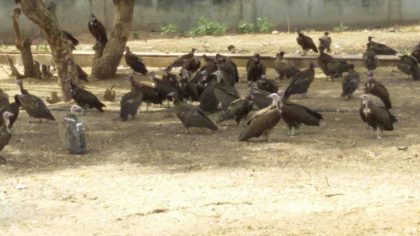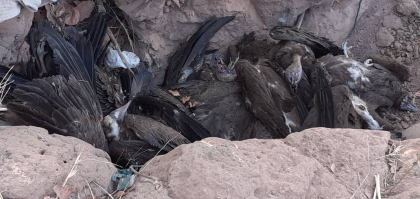THE MASSIVE DEATH OF HOODED VULTURE IN UPPER RIVER REGION IN SABI
by Fagimba Camara, Research officer West African Bird Study Association (WABSA)
October 2020
[Fagimba is one of Wildlife Tourism Australia’s newest members, and a dedicated conservationist. Although a tiny country, The Gambia it is one of the better-known wildlife tourism destinations in Western Africa]
*** see Update at the foot of this page ***
The Gambia harbours a rich biodiversity of terrestrial, coastal, marine, wetlands habitats and species of national, regional and international significance. More than 566 species of bird have been recorded in The Gambia (Emms and Barnett, 2006).
Hooded vultures are threatened by direct persecution, habitat loss, land management changes, hunting for medicinal and spiritual rituals, pollution, poisoning, electrocution, wind turbine collisions, modern closed abattoir constructions and other factors. Some of these causes appear to apply in the Gambian case. On 9 February 2020 an incident happened in Sabi abattoir where more than 50 hooded vultures were found dead in the slaughter house grounds.
Sabi is a village located in the Upper River Region, one of the six administrative regionsof the Gambia. Its capital is Basse Santa Su. It has been re-organized as the Basse Local Government Area. Per 2013 census, the region had a population of 239,916 with a population density of 116 Per Km square . The total number of households was 12,454 as of 2003. The poverty gap ratio was 25.9 per cent as of 2003 and the literacy rate was 49.5 per cent ).

The Hooded vulture is listed as Critically Endangered on the IUCN Red List. Recently published evidence suggests the population is experiencing an extremely rapid decline owing to indiscriminate poisoning, trade for traditional medicine, hunting, persecution and electrocution, as well as habitat loss and degradation. According to roadside counts of Hooded vultures (funded by Hawk Mountain Sanctuary) in the Western Region of the Gambia, a total of 1543 were counted in 2013 representing 12.0 individualsper km while 3416 counts were made representing 17.5 individuals per km in 2015. (Jallow et al 2016). According to this data, The Gambia has a very high density for hooded vultures although this species is currently listed globally as endangered and listed in CITES appendix I after the last COP of CMS held in Philippine November 2017.
On 9 February 2020, a mass mortality of more than 50 Hooded Vultures in Sabi village abattoir was found in The Gambia. This is believed to be the largest standalone incident of vulture deaths to date in The Gambia. After field excursions by Molifa Ceesay, National Environment Agency officer, on 9 February 2020 just before COVID-19 restrictions, he received a call from a public health officer in the Sabi Health Center, informing him that a massive death of vultures occurred in the Sabi abattoir .

According to National Environment Agency(NEA) officer Molifa Ceesay, this incident in Sabi village happened early in the morning after animals had been slaughtered and inspected by the livestock officer on the ground, and confirmed as fit for human consumption, and the meat had been introduced for sale in the markets.
The Sabi abattoir has open discarded blood of slaughtered animals, and vultures normally feed on the blood and other left-over portions of the animal bodies. After feeding on the blood and the left-overs, observers on this day recorded more than 50 deaths in the abattoir grounds.
The team which went to the site to investigate the cause of mortality of hooded vulture in the Abattoir comprised several institutions:National Environment Agency (NEA), Department of livestock (DL), Public Health (PH), Food Safety Quality Agency(FSQA), andWest African BirdStudyAssociation (WABSA). They collected the dead vultures, and disposed of the blood and other remains, to avoid further death of vultures.The cause of the death is still unknown.
RECOMMEMDATIONS
A sample of the discharged blood and suspected chemical stain should be collected and taken to lab for toxicology test
The abattoir should be suspended until it and its environment is thoroughly cleaned.
The meat on saleat the market shouldbe confiscated and to be kept safely by the livestock personnel in their refrigeratorsat MRC medical research council Bass.
The namesof the all the people who have already consumedthe meat should be registeredfor safety reasons.
The inspection team advised that all the dead vultures be buried in the bush, and this was done in their presence. Gloves were provided by health facility to used during buried of the dead vultures
CONSERVATION ACTION
The West Africa Bird Study Association (WABSA) will take Emergency conservation actions to prevent further killings of Critically Endangered (hooded vultures) species in the Gambia. The West African Bird Study Association (WABSA) is one of the leading conservation organization in the Gambia and has partnerships with Birdlife international, Africa Bird club (ABC) and other global conservation organizations. WABSA strives to conserve birds, their habitats and biodiversity, working with people towards sustainability in the use of natural resources. WABSA has successfully completed its first survey, carried out from 14 September to 18 September 2019 and funded by The African Bird Club (ABC), on current assessment of the status and distribution of eight vulture species in a country without poison or persecution. The conservation threats to hooded vultures in the Gambia are a big concern for WABSA, who are undertaking similar work with the Department of Parks and wildlife management (DPWM), and environmental education in schools and communities to explain to them the threats the hooded vultures are facing from illegal trade for belief-based use. The mass mortality of vultures in the Gambia is an urgent problem, and we believe that we are in a strong position to lead and engage with traditional healers, the abattoir manager, Department of Livestock and communities around abattoirs, and to take dead vulture samples for analysis.
CONCLUSION
Hooded Vultures are listed as Critically Endangered. Recently published evidence suggests the population is experiencing an extremely rapid decline owing to indiscriminate poisoning, trade for traditional medicine, hunting, persecution and electrocution, as well as habitat loss and degradation. International borders highlight the need for international collaboration of all stakeholders involved in vulture conservation
The greatest threat to African vultures is poisoning, which may occur over vast areas. Travelling more widely may also expose an individual vulture to more threats, particularly to more poisoned carcasses.
REFERENCE
Emms, C. and Barnett, L. (2006) The Gambia (Bradt Travel Guides)
UPDATE
Mass slaughtering of hooded vultures took place at the Gunjur Slaughter house on Monday 12th October 2020. Around 11am A total of 49 hooded vultures and 1 white back vulture were counted death in the Abbatoir premises and the surrounding. This death figure is believed to be far more since a lot of vultures come to feed at this slaughter house. Among the total deaths counted, 30 of them had their heads chopped off which is likely to be used for juju purposes. The rest of deaths whose heads were not removed were found on top of the slaughter house and in the surrounding thick grasses.A local resident at the scene said the waste dumped after the slaughtering was most likely poisoned which caused their deaths. Asked if he saw or heard of anyone responsible for this act, he replied no. The perpetrator must have done this sinister act of removing their heads during the night.Hooded vultures species is now considered critically endangered (IUCN) globally, although according to series of road count surveys conducted in West Coast Region and nationwide, the Gambia still appears to represent a stronghold for hooded vultures than other regions. It would be very important to alert authorities and local communities in The Gambia to the global significance of the vulture population and of its role in ecosystem processes and function. Culprits apprehend should be strictly charged to minimize and discourage intention killings of vultures for any purpose whatsoever.

Trackbacks/Pingbacks